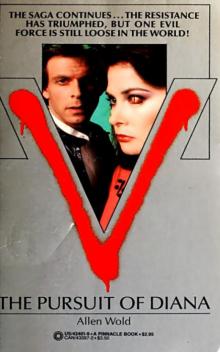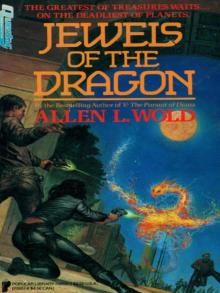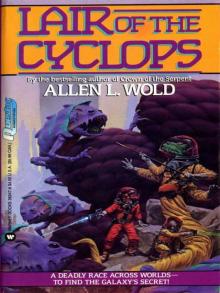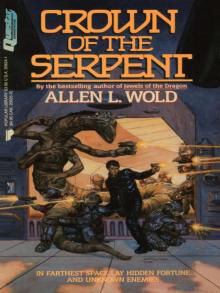- Home
- Allen Wold
The Pursuit of Diana Page 2
The Pursuit of Diana Read online
Page 2
"Then let's get to work," Jason said. "We'll need screwdrivers, wire cutters, and wrenches." He turned to Markos. "You said there was a shop of some kind in the basement, didn't you?"
"Right. I'll go get whatever I can find."
"Great. Now, Ian," Jason said as Markos hurried off, "some of these devices just slip into mounts. Be careful with the plugs and stack everything over on that table. When Markos comes back, you show him what to do. I've got to get a truck and some help in carrying this stuff out." He left the man to his task and went out onto the balcony.
Jason went over to the stone railing, where the body of Mike's mother, Eleanor Dupres, still lay, a look of surprise on her face. Below him he could see none of the rebel leaders. Only revelers were visible. He called down to one.
"Find Robert Maxwell," he said. "I need some help up here."
"Haven't seen him," the man called back, his voice thick with drink.
"Then get Ham Tyler," Jason said.
"Haven't seen him either."
"Well, go looking for him, man," Jason Cunningham said as he hurried toward the stairs. "You," he called out to another rebel who was talking with two women. "Can you back a truck up here?"
"Sure thing," the man said and trotted off.
"What's up?" one of the women asked.
"We're going to save some Visitor technology," Jason told her. "They left a lot of stuff up here, and I'm going to need help getting it out." He started back to the control room, the two women coming up the stairs behind him.
Inside he found Markos and Ian working at disassembling the mass of electronics. Two dozen or more devices were already stacked on the table by the door, their wires dangling and tangled. Each piece of equipment was only two inches thick, typical of the compactness of Visitor electronics.
"It comes apart easily," Ian said, wielding a screwdriver to disconnect a heavy cable from a conduit, "but there's an awful lot of it."
"Cut the wires if you have to," Jason said, then turned to the two women. "Get this down to the track," he said. "Be careful with it if you can, but speed is more important than caution if it comes to that." He turned back to the instrument wall, picked up a wrench, and started undoing some of the more substantial mountings. "Going to be a real jigsaw puzzle putting this back together again," he said.
"What do you want?" a man's voice came from the door. Jason turned to see Ham Tyler, nicknamed the Fixer, and behind him the bulk of his friend, Chris Faber.
"Something here you might be interested in," Jason said, "if we can ever figure out how it works. I think some of this equipment was used for surveillance and espionage."
Ham's interest was suddenly aroused, though his only action was to raise an eyebrow. "Not really my line," he said, "but you've got a good point. Clemmons will know what to do with this. I'll send a message to him over in Detroit."
"Great," Cunningham said, and went back to his work.
Ham and Chris stepped out of the way as the two women rebels came back for another load of equipment, then went back out onto the balcony.
"I think we've done just about all we can here," Ham said. Chris Faber nodded, and again they stepped aside as the women, their arms laden with electronics, went past them down the stairs to where the truck was parked. The Fixer and his colleague followed, ducked around the open tailgate, and started across the lawn. Here the party was finally beginning to wind down. They saw Robert Maxwell, who now had drunks as well as wounded to attend to, and went over to say goodbye.
"But you can't leave now," Maxwell said. "I can't lead all these people by myself."
"You seem to be doing a pretty good job," Ham said.
"At least stick around until Mike and Julie get back," Robert pleaded. "You're the only other authority figure we have."
"My job's finished once the battle is over," Ham Tyler said. "You're the one who's going to have to put the pieces back together again."
"I would kind of like to see Alice again," Chris said musingly.
"Who's Alice?" Ham asked.
"Just a friend," Chris replied. "Just like to say good-bye."
"You're getting soft," Ham said disgustedly.
Robert grinned. "I thought you and Alice seemed to be getting on pretty well ever since the raid on the pumping station."
"She's a tough lady," Chris Faber said, his face bland.
"So, how about it," Robert asked Ham, "you going to stay with us just a little while longer?"
"I guess I've got no choice." He rubbed his hand across his thinning hair. "And, yes," he admitted, "I would like to know if Donovan's all right."
"That's what's got me worried," Maxwell said. "We should have heard from him by now."
"At least we know that they were able to stop the doomsday bomb," Chris said.
"Unless it blew up on the other side of the world," Ham countered.
"No," Robert said. "A bomb that big would have been noticeable even then, if it had gone off. Even against the full light of day, we would have seen the flash shining around the world like a new kind of sunset. But the fact that it didn't go off is all we know."
"All right," the Fixer said, "I'll go along with you, but there are other groups all across the country, and they're going to have to be informed too. If we don't hear from Donovan pretty soon, I'll just have to get back to the network. Besides, there will be plenty of other jobs for me during the aftermath."
"Right now," Robert Maxwell said, "we've got to get everybody into the trucks, and a lot of them are drank. They'll follow your orders, Ham. Let's do it."
"There's one other thing," Ham said. "If Donovan and the others are all okay, they'll be bringing that Mother Ship back, isn't that right?"
"Of course," Robert answered, "unless they want to stay up there forever."
"How do you think the people of Los Angeles are going to feel about it when that thing is back in the sky again?"
"I hadn't thought about that," Robert said.
William and another fifth columnist, George, stepped out of a large compartment into a corridor of the ship. Both carried sidearms, as did two or three others who, having been given the antitoxin, were at least momentarily immune to the thick red dust which covered everything. Other Visitors, trustees wearing respirators and torn-off sleeves to distinguish them from fifth columnists, were carrying bodies from the corridor into the compartment. These workers were a few of the survivors whom William had known, and had suggested could be trusted, at least somewhat. Those fifth columnists who did not need respirators were removing all weapons to yet another compartment before the trustees got to them.
"It hurts to find people you recognize," George said, turning over one of the dead soldiers.
"Are you sure that compartment can be completely sealed?" William asked, indicating the place to which the bodies were being removed.
"I checked all the inside vents," George said. He moved to another body and tossed the dead soldier's rifle to a fifth columnist. Only those who had been with the invasion force were trusted to handle weapons, and there were few enough of them.
William went up the corridor in the direction of the docking bay. The bodies here had all been taken to another compartment, which also had been sealed. Two or three of his shipmates, now in respirators, were sitting on the deck, resting a moment before going back to work.
"Is it my imagination," one of these asked, "or is the air beginning to get bad in here?" He was breathing heavily, and not just from the exertion. The temperature was slowly rising as well.
The ventilation has been cut off for over an hour," William said "Nobody gets fresh air until this corridor is cleared." He didn't like playing the tough guard, but somebody had to do the job. The three in respirators struggled to their feet and went back up the corridor to where George and the other fifth columnists were supervising the continuing work. William sighed and followed them. There was an awful lot to do, and so little time to do it in.
Elias Taylor stood guard just inside the door
to the quarters that so recently had been Diana's. A rebel and a fifth columnist, escorting three Visitors in respirators, came to a halt until Taylor let them in. There at a table sat Martin and Peter, shuffling a stack of papers. Peter, a fifth columnist of long standing, checked names off a list while Martin took three slim folders from a stack beside him.
The Visitors and their guards stopped in front of the table. At Martin's nod, Elias closed the portal. There came the sound of air hissing through the ventilator system. After a moment, that too stopped.
"You can take off your respirators now," Peter told the three prisoners. The two men hesitated, but the third, a woman, complied immediately. When she didn't collapse choking, the other two followed suit.
"The situation is this," Martin said. "We are stranded in space. All the other Mother Ships are now on their way out of the solar system. At this moment, we can neither join them nor go back to Earth. In trying to get Diana's doomsday device as far from the planet as possible, we suffered the loss of two engines and some slight structural damage. That must be repaired." He looked down at his folders. "You were all with the engineering section. Are you willing to help us get this ship running again?"
One Visitor, whose artificial face had Oriental features, shrugged his shoulders. "I couldn't even if I wanted to," he said. "I was just a maintenance man, not an engineer."
"How about you?" Peter asked the second man. The prisoner just stared at him, disdain evident on his face. Peter sighed and made a mark on his list. Then he and Martin both looked at the woman. Her gaze shifted from one to the other. She put her hands to her face a moment, then sighed.
"Yes," she said, "I'll help. I guess we'll all die if I don't."
"That's correct," Martin said.
Elias came up and led the woman Visitor through a door at the side while the guards gave the two men their respirators back. One of them picked up the third respirator to take with them back to the other Visitors yet to be interviewed. Elias returned, let the four of them out of the room, then turned back to Martin.
"How many so far?" he asked.
"Seven," Martin said. The strain was showing. "But none of them is really qualified. And we're not going to be able to keep refreshing the air in here much longer."
Elias heard footsteps out in the corridor and went to admit three more prisoners and their two guards. As before, the prisoners were wearing respirators. And as before, once they were inside, Elias closed the door so the air could be refreshed.
Martin took up another stack of three folders, having put the last three to one side. Facing him now were three women, one apparently black. Once again he briefly told them the situation and asked if they would help. The three women looked at him but didn't answer.
"You all know," Peter said, "that Our Leader lied to us. The inhabitants of this world are not animals, but people not that different from ourselves in many ways. We have committed a great crime by trying to steal their water and take them back as food. It is up to us to make some small restitution."
"I'd rather die," the black Visitor said. She turned her face away. The second woman looked at her with disgust.
"We may die anyway," she said. "Much good it will do you. Yes," she said to Peter, "I'll help."
"You're a fool," the third woman said. "How long do you think they'll let you live after they get you back to Earth?"
"I'll take my chances," the second woman said.
"Thank you," Martin told her as Elias came up to lead her to the inner room. The guards gave the other two prisoners their respirators and, carrying the third respirator, led them back out into the hall.
"That one will be a real help," Peter said, checking a name off his list. "She's a qualified engineering supervisor."
"I don't think I trust her," Elias Taylor said. "She seemed just a little too willing."
"I don't think so," Martin said, "but even so, what choice do we have?"
"I know, I know," Elias said, "but think about it. She could sabotage the engines instead of repairing them."
"I think I can remember enough of my training," Martin said "to be able to detect that if she tries it." The door tone sounded, signaling the arrival of yet more interviewees. "Let's get back to work," Martin said tiredly.
Elias started to protest, then shook his head and went to open the door. Beyond, as expected, were two more guards and three more Visitors. This was going to take a long time.
Barbara sat at the communications console in the command center. The screen in front of her showed the interior of a barracks. Twenty or so Visitor soldiers, armed and armored but with their helmets off, sat or stood around within range of the camera.
"Let me speak to your ranking officer," Barbara said. The soldiers, grim and angry, exchanged glances until one, a sergeant, came to the front of the group.
"I guess that's me," he said. His attitude indicated he didn't really give a damn.
"Sergeant," Barbara said in a tired voice, "as you are now aware, we control the entire ship. You are the last platoon of soldiers left alive. The others all died when the toxin was pumped into portions of the ventilating system." The sergeant lost his devil-may-care expression, and the other soldiers with him began muttering to each other. "That is hard news, I know," Barbara went on, "but that's the way it is."
"So what do you want?" the sergeant asked.
"We don't want to kill any more of you than is necessary," Barbara said, "but we can't let you keep your weapons. Several of our people are outside your door right now. Put all your weapons into the security locker and move to the far side of the room. I'll unseal the door then, and let our people in."
"And then they'll shoot us all down?" a soldier in back called out.
"No," Barbara said. "If we wanted to kill you we could do it without risk. All I'd have to do is pump toxin directly into your barracks." She didn't like threatening them with this, especially since she knew several of the men and women there. The sergeant's expression became even more grim. Barbara let the soldiers talk it over among themselves.
"What will it be?" Barbara asked after a moment. "You'll have to make up your minds fast. We have too much else to do."
The sergeant came away from his men and again faced the camera. "All right," he said. "We'll go along with you."
Barbara watched as one by one the soldiers went to the locker at the side of the barracks, put in his or her weapon, and then retreated to the other side of the room. She tried to see that each did as instructed, but sometimes two or three of the soldiers would crowd in together. At last they finished. Barbara took a breath, punched a button, and the barracks portal unsealed.
Outside the portal, two rebels and two fifth columnists heard the lock click, then went inside, guns drawn. While one of the fifth columnists went to the gun cabinet, the other three kept the soldiers covered. The fifth columnist at the cabinet took a heavy device the size of a paperback book from his pocket and placed it over the latch. But before he could trip the lock, one of the soldiers pulled a pistol he'd kept concealed, and shot him through the head.
His victory was short-lived. The other three guards all fired in unison, and the soldier fell, blue sparks racing across his chest and abdomen.
"Anybody else want to try something?" the rebel in charge asked while the other fifth columnist went over to the gun cabinet. The soldiers stood silently.
"He's dead," the man at the cabinet said, kneeling over his fallen companion. He stood and touched the switch on the locking device. There was a crackling as bolts welded themselves to the latch and door. He grabbed his dead friend by the shoulders and while the two rebels covered him, dragged him out the door.
You'll have to tend to your own dead yourself," the rebel in charge said. As he stepped back out into the hall, the door closed, and he could hear it lock again.
Barbara watched the scene grimly. Several of the soldiers went to the cabinet, but the locking device resisted their efforts to remove it.
"There's still one
gun in that room," Mike Donovan said, coming up to look over her shoulder.
"That's true, but the situation is a lot better than it was before. We could have lost twenty lives instead of just two."
"But we can't trust any of them," Mike said. "Can the gun shoot off the lock?"
"No. It's a special security device designed against that very thing. At least we can stop worrying about them for a while."
She switched the view to another part of the ship, a section of corridor where the fighting had been heavy. It was clear of bodies now, and the red dust on the floor was smeared with footprints and the tracks of dragged corpses.
"Looks good," Mike said. "How much more left to go?"
Barbara switched the scene again. Another empty corridor. Yet another shot showed Sancho Gomez and his crew still working. Visitor trustees in respirators were carrying bodies into a compartment under the watchful eye of several armed rebels and fifth columnists.
Barbara turned on the mike and spoke into it. "How is it going?" she asked.
Sancho Gomez looked up at the corner of the corridor wall from which Barbara's words had come.
"We're almost through here," he told her. "Then just two more sections left."
"Very good," he heard her answer as he went back to his work.
The compartment into which the bodies were being carried was stacked high. Trustees in respirators brought in the last of them from the corridor, then left as Sancho surveyed the scene one more time. He turned away at last and closed the door behind him. He did not notice that one of the last bodies, that of Captain Jake, did not lie perfectly still but rolled over.
"That's the last of them," Elias Taylor said as he let yet another group of guards and prisoners into Diana's quarters. Martin and Peter slumped in their chairs as the three approached their desk. The prisoners were all men this time, all resembling Caucasians.
The resonance in Peter's voice was coarsened by fatigue as he explained yet again what he wanted of these people. One of the three men nodded his head in agreement.

 V: The Crivit Experiment
V: The Crivit Experiment The Pursuit of Diana
The Pursuit of Diana Jewels of the Dragon
Jewels of the Dragon Lair of the Cyclops
Lair of the Cyclops Crown of the Serpent
Crown of the Serpent